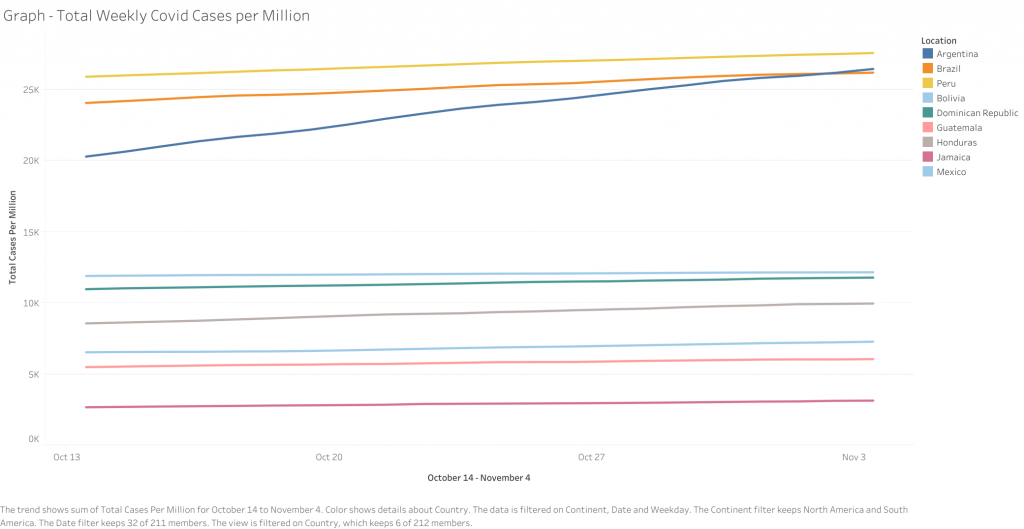What you should know
- UN Secretary-General António Guterres praised Caribbean nations for their COVID-19 response, calling the crisis a once-in-a generation opportunity to create a new alliance for an inclusive, sustainable, and resilient recovery.
- Eight of every 100 infections reported globally are in Latin America and the Caribbean. See below for the latest figures.
- As the United States awaits final election results, here are five items that should make their way to the top of the US’ regional agenda.
Quarantine + reopening plans
Countries have once again focused on domestic affairs, issuing updated national guidelines.
- Beginning on November 5, Chile’s nightly curfew will start at midnight instead of 8:00 p.m. and end at 5:00 a.m., except in the southernmost region of Magallanes which will maintain the earlier curfew. The longer curefew wil remain in place in Magallanes due to an increase in coronavirus cases.
- Uruguay Minister of Tourism Germán Cardoso ruled out the possibility of shutting beaches during the approaching summer season. Instead, the government will issue guidelines allowing for “responsible freedom,” relying on the judgement of its citizens. Uruguay has the lowest case count in South America and did not implement a mandatory quarantine.
- Colombia extended the period of selective quarantine until November 30, due to the increase in COVID-19 cases over the last few weeks. Colombia’s selective quarantine – which allows dining at restaurants and authorizes international flights – began at the start of September, following five months of full lockdown.
- On November 3, the Mexican state of Durango reinstated quarantine measures, prohibiting non-essential activities and restricting the hours of supermarkets, pharmacies, banks, and restaurants. The state will remain in the red category of the national four-colored traffic light system until November 17. Chihuahua became the first state to return to red on October 22.
- Costa Rica extended vehicular circulation restrictions until November 30 and maintained a 9:00 p.m. curfew, although the government removed fines for noncompliance.
International travel restrictions
- On October 29, the Argentine Ministry of Transportation formally authorized international flights. However, only Argentine citizens and residents as well as tourists from neighboring countries will be allowed to enter. On November 2, travelers from Montevideo, Uruguay, were permitted to enter Buenos Aires by boat for the first time since March.
- Venezuela will allow flights from Turkey, Dominican Republic, Mexico, and Iran. Nicolás Maduro had previously said that the country would resume international flights by the end of the year.
- The US Department of State renewed its level three travel advisory for Colombia. Citizens are encouraged to avoid traveling to Colombia due to an increase in COVID-19 cases and violence.
- St. Kitts and Nevis reopened its borders on October 31, allowing citizens and permanent residents stranded by the lockdown to return home for the first time since March.
- On November 1, the Dominican Republic lifted restrictions prohibiting the docking of cruise ships.
Economies in focus
Economic Impact
- Chile’s economic activity fell by 5.3 percent in September year-on-year but grew 5.1 percent from the previous month, according to Central Bank figures.
- S&P Global Ratings maintained Colombia’s investment-grade rating of BBB-. S&P projects that Colombia’s GDP will increase by nearly 6 percent in 2021.
- Mexican Undersecretary of Finance Gabriel Yorio confirmed that the country will not use the flexible credit line offered by the IMF in 2020 or 2021, despite recent negotiations to maintain access to the funds.
- The Central Bank of Guatemala reported that commerce, which accounts for over 19 percent of the country’s GDP, fell by nearly 11 percent in the second trimester of 2020.
- The IMF estimates the Argentine economy will recover by 5 percent in 2021, after falling 12 percent this year.
- According to national polling form Ipsos, nearly 50 percent of all Panamanians have used almost all of their savings due to the COVID-19-induced economic crisis.
Economic Relief
- Peru’s Congress unanimously approved a law authorizing citizens to withdraw up to $4,765 of their holdings from private pension funds. The law authorizes the withdrawal for those who have not made contributions for more than 12 consecutive months.
- The IMF reached a staff-level agreement with Honduras to complete the third review of Honduras’ Stand-By Arrangement (SBA) and the Stand-by Credit Facility (SCF), allowing for the disbursement of $88 million to combat the economic impact of the pandemic. The decision is subject to approval of the IMF executive board.
- The IMF also reached a staff-level agreement with Barbados to provide an additional $90 million in funding to help finance the emerging fiscal deficit and related balance of payments need. The IMF is expected to review the agreement in December.
Resilience, recovery + renewal
New Episode: The Acceleration of Innovation in Healthcare: The Rise of Digital Health Services
The COVID-19 pandemic has demonstrated the need for transformation and innovation across all sectors, but particularly the healthcare industry. Though the existence of telehealth and other digital health services are not new, the pandemic has altered the way healthcare is being delivered and accelerated the adoption of these technologies.
In the newest episode of Baker McKenzie’s Resilience, Recovery and Renewal podcast series, experts discuss the critical nature of fostering innovation and the role that both government and the business community play, with a special focus on the healthcare industry and the rise of digital health services.
Guests: Veleka Peeples-Dyer (Chair of the FDA Practice Group, Baker McKenzie) and Vanina Caniza (Global Chair of the Baker McKenzie’s Healthcare & Life Sciences Group).
Subscribe to the 3R podcast series: Apple Podcasts | Spotify | Google Podcasts
We also invite you to join Baker McKenzie’s healthcare and life sciences Webinar Series and new podcast series, Health Pod, covering a number of different global trends in the industry.
Health + innovation
- On November 3, Brazilian health regulator Anvisa authorized resumption of a clinical trial of Johnson & Johnson’s COVID-19 vaccine.
- On November 2, Argentine President Alberto Fernández announced the country will buy 25 million doses of Sputnik V — Russia’s main experimental COVID-19 vaccine. Ten million doses are expected to arrive between December and January. The RUTI vaccine, developed by researchers at the Germans Trias i Pujol Hospital in Barcelona and produced by Spanish pharmaceutical company Archivel Farma, was approved on October 29 for international clinical trials, which will be conducted in Agrentina. RUTI will be tested on 369 Argentinians over a period of nine months.
- On October 30, Mexico received the first doses of a COVID-19 vaccine from Chinese pharmaceutical company CanSino Biologics Inc. for a late-stage trial involving 10,000 to 15,000 volunteers.
- On October 29, Sanofi and GlaxoSmithKline announced an agreement with Gavi to provide 200 million doses of their COVID-19 vaccine to the COVAX initiative. Argentina, Brazil, Chile, Colombia, Dominican Republic, and Mexico have publicly supported the COVAX initiative.
Country Focus
- Brazil: More than 300 people gathered in São Paulo to protest a potential government mandate ordering citizens to take a coronavirus vaccine when one becomes available.
- Chile: The country’s COVID-19 commission found that despite recommendations from international organizations, the Chilean government did not fully implement measures to prevent the spread of the virus. According to the report, the approach resulted in an inability to effectively control the spread of the virus.
- Nicaragua: Eta made landfall in Nicaragua on November 2 as a category four storm. There are at least 30,000 people in shelters, more than 50,000 homes without electricity, and at least three fatalities due to the hurricane. Eta is expected to bring torrential rain and inland flooding as it travels through Northern Nicaragua and Honduras.
- Peru: A month and a half after President Vizcarra survived an impeachment trial, Peru’s Congress again approved a motion to initiate impeachment proceedings over corruption allegations. Vizcarra is set to appear before Congress on November 9.
By the numbers (continued)
- Cases by country: Brazil (5,567,126) #3 worldwide, Argentina (1,195,276) #7 worldwide, (1,099,392) #8 worldwide, Mexico (938,405) #10 worldwide, Peru (908,902) #11 worldwide, Chile (515,042) #16 worldwide, Ecuador (170,110) #35 worldwide, Bolivia (141,936) #37 worldwide, Panama (135,592) #40 worldwide, Dominican Republic (128,278) #43 worldwide, Costa Rica (112,120) #47 worldwide, Source: worldmeters.info
- Prevalence rate (total cases per million people): Aruba (42,422) #4 worldwide, Panama (31,258) #14 worldwide, Peru (27, 436) #19 worldwide, Chile (26,864) #20 worldwide, Argentina (26,364) #21 worldwide, Brazil (26,127) #22 worldwide, Costa Rica (21,941) #28 worldwide, Colombia (21,528) #30 worldwide, Bahamas (17,210) #37 worldwide, Saint Martin (14,544) #46 worldwide, Source: worldmeters.info
- Deaths per capita (deaths per million people): Peru (1,045) #3 worldwide, Brazil (753) #6 worldwide, Chile (748) #7 worldwide, Bolivia (746) #8 worldwide, Ecuador (716) #10 worldwide, Mexico (716) #11 worldwide, Argentina (707) #12 worldwide, Panama (630) #15 worldwide, Colombia (624) #16 worldwide, Bahamas (387) #29 worldwide, Source: worldmeters.info
Quick take


Sponsored By

